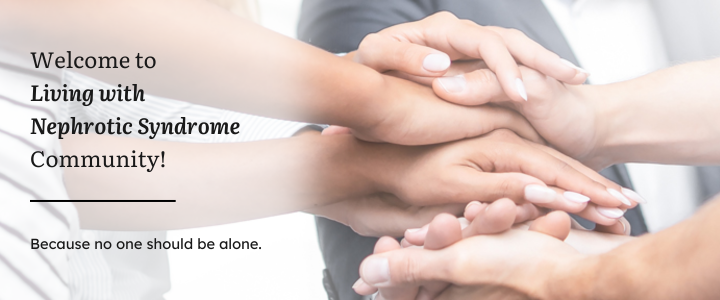
Living With Nephrotic Syndrome is an online support community by BensFriends.org for patients with rare diseases and chronic illnesses. Ben’s Friends provides a safe space for patients, caregivers, and families to connect and support each other.
Nephrotic syndrome is a kidney disorder that causes excessive protein loss in urine due to damage to the glomeruli, which filter waste and excess water. This damage allows proteins like albumin to leak into urine (proteinuria), lowering blood albumin levels. As kidney function declines, fluid builds up in tissues, causing edema.
Many different disorders can cause damage to the glomeruli, resulting in nephrotic syndrome. In some cases, damage is confined to the kidneys alone. Organs other than the kidney, in other cases, are also affected (such as in diabetes mellitus or systemic lupus erythematosus).
In children, the most common cause of glomerular damage is a condition known as minimal change disease. About 30% of adults with nephrotic syndrome have underlying conditions like diabetes or lupus; others have kidney disorders like FSGS.
Minimal change disease is a kidney disease that can occur in both adults and children. People with minimal change disease have normal or very mild abnormalities of the glomeruli.
Focal segmental glomerulosclerosis — FSGS is the most common cause of nephrotic syndrome in adults. FSGS causes collapse and scarring of some glomeruli. The cause of primary FSGS is unknown, although some cases (usually in children or young adults) are the result of a genetic defect, an infection, or a toxic response to a drug.
How is Ben’s Friends Different from Social Media and Other Support Sites?
Our mission at Ben’s Friends is to ensure that patients living with rare diseases or chronic illnesses, as well as their caregivers, family, and friends, have a safe and supportive place to connect with others like them.
We’re interested in you as a person, and in your struggles as a rare disease patient. But we don’t want to know your name or where you live. We won’t even allow you to use your real name when you register for one of our communities. Because when it comes to medical things, anonymity is important in our googly universe. Your information is never shared, and your activity never tracked by adware.
When Ben’s Friends asks for the country and region you live in, that’s in case your fellow members can recommend local resources and help, and so everyone knows what kind of medical system there is where you live. That’s important when it comes to giving and getting support. Because we are all about support, and we’re all in this together..
Ben’s Friends: Safe and Supportive.
And anonymous to keep it that way.
Why create an account in Living with Nephrotic Syndrome?
Posts on the different Ben’s Friends communities can be read by anyone on the internet. You can browse through the different topics and find most of the information you’re looking for but there are many things you won’t be able to do unless you create an account. These include:
Making your own posts. Although you’re able to find useful information just by reading other members’ posts, you might still have a lot of questions in your mind. Either you want to start a new topic to talk about them in detail or you want to reply to a comment on a thread. These won’t be possible unless you create a new user account.
Viewing other members’ profiles. Member profiles include information about the country or region they are from, whether they are a patient or a caregiver, and details about their disease and treatments. Maybe you came across an interesting post and you want to learn more about the member. Or maybe you’re looking for members who are from the same country as you. Having a user account allows you to see other member profiles and find information that may be relevant.
Sending private messages. Aside from being able to post publicly and commenting on a thread, having a user account also allows you to send private messages both to other members and moderators. In case you want to discuss a topic only with a specific person, this is possible by sending private messages when you have created your account.
Click here to create an account and join.
Latest Discussions
- Today is Giving Tuesday. Here Are Two Easy Ways to Help Our Communityby Ben_Munoz on December 2, 2025
Hi everyone, Today is Giving Tuesday, a day when many people look for meaningful causes to support. If you would like to help our community today, here are two simple and meaningful options. 1) Share our campaign with friends or family This is one of the most helpful things members can do. Even if you cannot donate, you can still make a big impact […]
- Our Community Is Coming Together. Here Is How You Can Helpby Ben_Munoz on November 25, 2025
Hi everyone, As we approach the end of the year, our entire Ben’s Friends network is launching our annual community support campaign. Each forum plays an important role, so we wanted to share a few simple ways you can help strengthen this space we all rely on. Most importantly, there is never any expectation to give financially. Just being here, […]
- What Treatments or Lifestyle Changes Have Helped You Most?by ModSupport on November 5, 2025
Managing Nephrotic Syndrome looks different for everyone. Some patients find relief with medications, while others benefit from diet changes or gentle exercise routines. What works for you might inspire someone else in our community. Let’s share what’s made a difference in your journey: Have you noticed improvement with low-salt diets or […]
- How Do You Cope Emotionally with Nephrotic Syndrome?by ModSupport on November 5, 2025
Living with Nephrotic Syndrome isn’t just about managing physical symptoms—it’s also about handling the emotional rollercoaster that comes with it. From the anxiety of test results to the stress of frequent hospital visits, many of us know how draining this journey can be. Let’s open up about the emotional side of things. Here are some […]
- About the Featured categoryby ModSupport on July 9, 2025
(Replace this first paragraph with a brief description of your new category. This guidance will appear in the category selection area, so try to keep it below 200 characters.) Use the following paragraphs for a longer description, or to establish category guidelines or rules: Why should people use this category? What is it for? How exactly is […]
- Welcome!by ModSupport on May 8, 2025
Welcome to Living with Nephrotic Syndrome – a safe space for sharing, learning, and supporting each other. Ready to join the conversation? Sign up now and become part of our supportive community. 4 posts – 1 participant Read full topic






